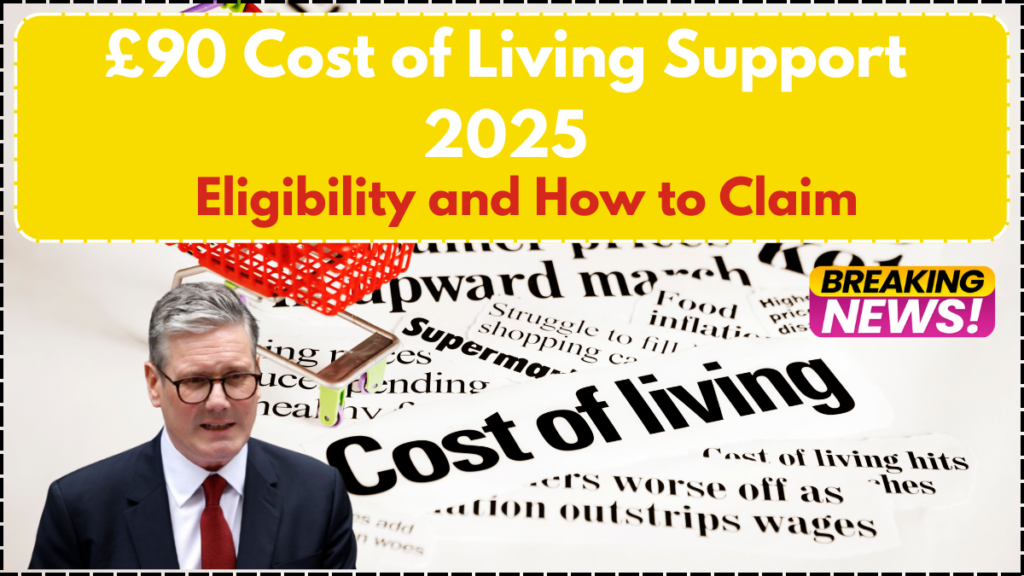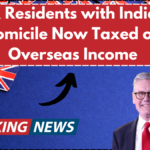With inflation still impacting households across the UK in 2025 April, the government has introduced a £90 one-time Cost of Living payment. This targeted support is designed to help low-income households meet essential needs such as food, energy bills, and other everyday necessities. As part of the Household Support Fund, the payment aims to cushion the financial blow many families are facing due to rising living costs.
Unlike previous schemes requiring formal applications, this payment is processed automatically for qualifying recipients, making it quicker and more accessible. Here’s everything you need to know about the eligibility criteria, payment timeline, and how to get help if you don’t receive the payment.

What Is the £90 Cost of Living Payment?
The £90 Cost of Living payment is a government-funded, one-off financial support grant for households facing economic hardship. Delivered through the Household Support Fund, the payment provides immediate relief to people already receiving means-tested benefits. Its primary purpose is to help cover costs for food, utility bills, and other essentials.
Unlike ongoing welfare schemes, this grant is a one-time disbursement and part of a wider framework of local and national assistance initiatives, including school meal vouchers and emergency utility aid.
Quick Overview of the Payment
| Aspect | Details |
|---|---|
| Amount | £90 (single payment) |
| Purpose | Support for food, energy, and essentials |
| Eligibility | Based on specific means-tested benefits |
| Application Required | No (automatic for eligible households) |
| Payment Method | Bank transfer, cheque, or voucher |
| Funded By | UK Household Support Fund |
| More Info | Available on GOV.UK or local council websites |
Who Qualifies for the £90 Payment?
Eligibility is determined automatically using Department for Work and Pensions (DWP) records. Households must currently be receiving at least one of the following:
- Universal Credit
- Income-based Jobseeker’s Allowance (JSA)
- Income-related Employment and Support Allowance (ESA)
- Income Support
- Pension Credit
These criteria ensure that the support reaches those who are most financially vulnerable. Since eligibility is monitored by the DWP, no manual application is needed for the general payment.
Payment Timeline for April 2025
The payment rollout began in early April 2025 and is expected to continue throughout the month. Although most qualifying individuals should receive the money by the end of April, timelines can vary slightly based on local council processing speeds or bank verification delays.
To track the status of your payment, keep an eye on official DWP communications or check your account if you normally receive benefits via direct deposit.
What to Do If You Haven’t Received It
If April passes and you haven’t seen the payment in your account or via cheque, here are the steps to follow:
- Verify Benefit Status: Confirm that you’re currently receiving one of the qualifying benefits.
- Check Personal Information: Ensure your contact and bank details are up to date with DWP.
- Reach Out: Call or email the DWP to raise a non-payment query.
- Explore Local Council Support: Councils may offer additional funding via the Household Support Fund for those not covered.
Applying for Local Household Support (if Needed)
While the main £90 payment is automatic, additional grants under the Household Support Fund may require applications. Here’s how to proceed:
- Use the GOV.UK council finder to locate your authority.
- Review eligibility criteria specific to your local area.
- Submit applications online or through customer service lines.
These grants can include help with rent arrears, white goods, or emergency travel expenses.
Key Role of the Household Support Fund
The £90 payment is just one part of a broader effort. The Household Support Fund also covers:
- Free school meal vouchers during holidays
- Support with gas and electric bills
- One-time grants for clothing, appliances, and hygiene products
This multi-pronged support ensures households receive aid tailored to different types of needs.
Practical Tips to Manage Rising Costs
Even with extra support, smart budgeting is essential. Consider these practical ways to make your money go further:
- Cut Energy Waste: Use smart plugs, turn off standby devices, and seal drafts.
- Grocery Savings: Stick to meal plans, buy in bulk, and explore local food co-ops.
- Transport Options: Carpool, cycle, or use railcards for discounted travel.
Conclusion
The £90 Cost of Living payment, issued in April 2025, provides timely financial relief for low-income households struggling with day-to-day expenses. If you qualify, the process is designed to be straightforward and automatic. However, it’s important to stay informed, check your eligibility, and ensure your personal records are current with the DWP. For those who don’t meet the criteria, alternative support options are available through local councils.
FAQ
What is the purpose of the £90 Cost of Living Payment?
This grant is intended to help low-income households afford essentials like food and energy during a time of high inflation.
Do I need to apply to receive the payment?
No. If you’re eligible, the payment will be processed automatically.
When will the payment be made in April 2025?
Most recipients should see the payment arrive by the end of April, though timing can vary by council and benefit schedules.
What should I do if I haven’t received my payment?
First, check your benefit status and personal details. If everything is up to date, contact the DWP for assistance.
Is this payment part of Universal Credit?
No, it is a separate one-time payment linked to, but not included in, Universal Credit or other qualifying benefits.
Can students receive this payment?
Only if they are also receiving one of the eligible benefits.
Are pensioners included?
Yes, if they receive Pension Credit.
Can I still apply for extra help if I don’t qualify for this payment?
Yes, local councils have additional support schemes that you may be eligible for.
Will this affect my other benefits?
No, the payment is non-taxable and does not impact existing benefits.
Where can I find more information?
Visit GOV.UK or your local council’s website for the latest updates and application details.
For More Information Click Here
Pari is a passionate writer known for captivating stories that blend imagination and reality. Inspired by travel, history, and everyday moments, Pari crafts narratives that resonate deeply with readers.




